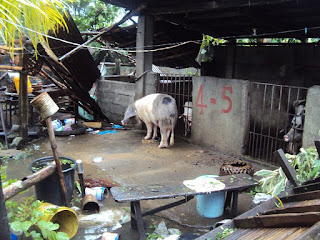Two weeks after Pedring hit Philippine responsibility water-borne diseases and illnesses are prevalent during such catastrophe. As I been writing this short article, I want to share the meaning and symptoms of Leptospirosis and Hypothermia.
"Leptospirosis is an infectious disease caused by a type of bacteria called spirochete. It can be transmitted by many animals such as rats, skunks, opossums, raccoons, foxes and other vermin. It is transmitted through contact with infected soil or water. People contract the disease by either ingesting contaminated food or water or by broken skin and mucous membrane (eyes, nose, sinuses, mouth) contact with the contaminated water or soil.
The symptoms includes headaches, muscle aches, eye pain with bright lights, followed by chills and fever. Watering and redness of the eyes occurs and symptoms seem to improve by the fifth to ninth day.
The second phase begins after a few days of feeling well. The initial symptoms recur with fever and aching with stiffness of the neck. Some patients develop serious inflammation of the nerves to the eyes, brain, spinal column (meningitis) or other nerves. Right upper area abdominal pain may occur. Less common symptoms relate to disease of the liver, lungs, kidneys, and heart."
"Leptospirosis is an infectious disease caused by a type of bacteria called spirochete. It can be transmitted by many animals such as rats, skunks, opossums, raccoons, foxes and other vermin. It is transmitted through contact with infected soil or water. People contract the disease by either ingesting contaminated food or water or by broken skin and mucous membrane (eyes, nose, sinuses, mouth) contact with the contaminated water or soil.
The symptoms includes headaches, muscle aches, eye pain with bright lights, followed by chills and fever. Watering and redness of the eyes occurs and symptoms seem to improve by the fifth to ninth day.
The second phase begins after a few days of feeling well. The initial symptoms recur with fever and aching with stiffness of the neck. Some patients develop serious inflammation of the nerves to the eyes, brain, spinal column (meningitis) or other nerves. Right upper area abdominal pain may occur. Less common symptoms relate to disease of the liver, lungs, kidneys, and heart."
 |
| poultry and hogs are affected |
 |
| pics taken by my cousin (chicken eggs) |
 |
| human waste, stagnant water, muds, animal waste mixed-up |
 |
| pics courtesy of fanpage "Isabelino Ako" |
"Hypothermia can occur when you are exposed to cold air, water, wind, or rain.
Your body temperature can drop to a low level at temperatures of 50°F (10°C) or higher in wet and windy weather, or if you are in 60°F (16°C)to 70°F (21°C) water. If you have mild hypothermia, home treatment may be enough to bring your body temperature back up to normal.
Early symptoms include: shivering, cold, pael, or blue-gray skin, numb hands and
fingers, slurred speech. Late symptoms include: muscles become stiff, slow pulse, breathing that is shallow and slower, weakness or sleepiness.
It is an emergency condition and can quickly lead to unconsciousness and death if heat loss continues. If someone begins to shiver violently, stumble, or can't respond to questions, suspect hypothermia and warm him or her quickly."
 |
| Pics by Jeff of Cauyan Aking Ciudad fanpage |

No comments:
Post a Comment